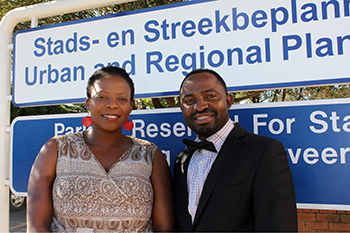Latest News Archive
Please select Category, Year, and then Month to display items
03 October 2018
|
Story UFS
|
Photo Katlego Sekele
 Students engaged authorities and Student Affairs
representatives on sexual and gender-based matters.
Students engaged authorities and Student Affairs
representatives on sexual and gender-based matters.
Do you know enough about the Sexual Harassment, Sexual Misconduct and Sexual Violence policy adopted by the university in June 2018? The Office for Gender and Sexual Equity (GSE) at the University of the Free State (UFS) hosted a dialogue on the role of the institution in matters of sexual and gender-based violence and addressing issues surrounding sexual violations.
Developments such as the countrywide #TotalShutdown: Intersectional Women’s March Against Gender-based Violence last month serve as proof of the dire need for issues surrounding sexual violations to inform policies and active safety measures.
Policy purpose
According to the policy, the objectives are to create a safe and enabling environment, establish a common understanding of what constitutes sexual harassment, sexual misconduct and sexual violence, provide applicable and accurate information, ensure that victims receive the necessary support, clearly outline disciplinary procedures for perpetrators, and clarify institutional accountability.
Student’s take on solutions
Tammy Fray, a member of the Student Representative Council, who formed part of the panel at the discussion, says the policy is not a one-stop-shop solution. “The policy is a guiding document. We have to then use it to inform activist work. We cannot always put the onus on policies and codes of conducts to solve problems. However it is our responsibility within this academic space to come up with solutions that enhance the way the policy works.”
Be informed about the policy
It is important to understand the stipulations of the policy in order to make full use of it. Geraldine Lengau, Officer at the GSE said: “It’s important that students know that the institution is not operating in silos but that their demands have been heard and the institution has acknowledged that there is a need for the policy to be adopted. It also makes the process of reporting better with the assistance of the Sexual Assault Response Team coordinator.”
Young academic receives BRICS research funding
2017-04-13

Dr Thulisile Mphambukeli and Dr Victor Okorie
from the Department of Urban and Regional Planning
at the University of the Free State.
Photo: Rulanzen Martin
“It means a lot to me, as I am a young academic embarking on my postdoctoral research project. To be able to lead a team of researchers from various research institutions in South Africa is humbling.” This is what Dr Thulisile Mphambukeli had to say on being awarded a research grant by the South African BRICS Think Tank.
The think tank, in collaboration with the National Institute for the Humanities and Social Sciences (NIHSS), awarded the lecturer in Urban and Regional Planning at the University of the Free State (UFS) R150 000. She will spearhead a research project between BRICS (Brazil, Russia, India, China, and South Africa) universities. “They have awarded me a three-month grant to facilitate a process of combining various research projects under the BRICS Academic Cluster,” Dr Mphambukeli said.
Platform provides collaboration
“The academic cluster provides a platform for researchers and academics to engage in ongoing collaboration,” she said. The grant will enable her and her research partner, Dr Victor Okorie, postdoctoral fellow in the Department of Urban and Regional Planning at the UFS, to put together a research proposal to be submitted at the end of May 2017. If successful, her team will conduct a research study across BRICS countries over a period of three years. It will be done in collaboration with various South African universities, who will form a team to collaborate with researchers from BRICS universities.
Great accomplishment for UFS
“The funds we have received are quite a great accomplishment for the UFS and our department,” Dr Okorie said. The UFS has become a force to be reckoned with when it comes to emerging issues in BRICS politics and policies. “Our project looks at the provision of ecosystems, agriculture, and security and the UFS was chosen as the host institution.”